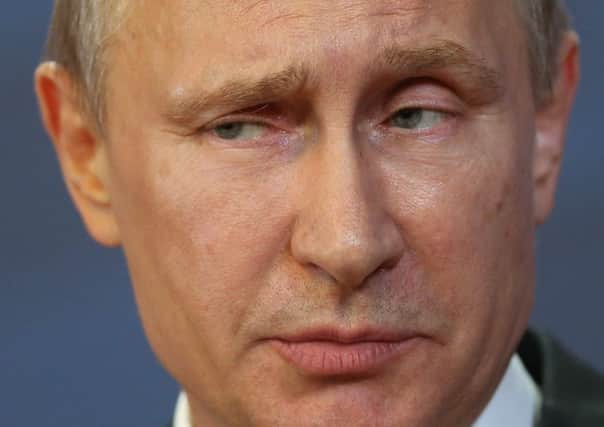Peter Jones: Putin set on restoring Russian empire


When the Cold War ended with the collapse of the Soviet Union, western thinkers proclaimed the victory of liberal democracy over communist totalitarianism.
They argued the coming challenge for western countries would be the rise of militant Islamism. In that they were right, but in consigning the Cold War clash to the dustbin of history, they were wrong. Vladimir Putin is reviving it and not just in Ukraine.
Advertisement
Hide AdAdvertisement
Hide AdThe mistake is to assume that liberal democracy – freedom of speech, a market economy, rule of law, political power springing from the ballot box – is the natural order which will flourish when the problem suppressing them, such as a nasty dictator or a clique adhering to an evil ideology, is removed.
We made that mistake in Afghanistan, Iraq and the Arab Spring. It is time to stop repeating it. It is time to recognise that the liberal democracy we cherish is under attack, not just from violent Islamism, but also from, for want of a better word, Putinism.
This has only loose connections with communism and rather more to do with the effects of its collapse. True, this and the arrival of much more freedom of expression was heartily welcomed by many Russians, not least the few who became grossly enriched by the robber baron capitalism it ushered in.
But on the other side of the coin, the disappearance of Russia’s empire – in eastern Europe and southern Asia – which, in comparison to the dissolution of the British Empire, happened overnight, was a humiliation which rankles.
Once Russia was a great power to whom everyone paid obeisance, then suddenly it wasn’t.
Putinism is about restoring that power and he does not much care about how he goes about getting it. Neither do, according to the broad popular support his actions in Ukraine seem to have, the Russian people, who seem to have broadly bought Mr Putin’s view of the world pumped out by the state-controlled media.
Since the chaos of the Yeltsin period, Russia’s people have mostly experienced rising prosperity. This has come to a sudden halt, mainly because of the oil price tumble. The currency has collapsed and there are shortages of imported food.
Mr Putin portrays this as all part of western intrigue with Russia as the victim. The conflict in Ukraine, you see, is not Russia’s fault, but the result of western aggression.
Advertisement
Hide AdAdvertisement
Hide AdThe uprisings which resulted in the ousting of Viktor Yanukovych as Ukraine’s president were not popular revolts against repressive corruption, but were, in Mr Putin’s view, conspiracies constructed by western special forces, principally American, aimed at moving Nato’s frontier right up against Russia’s underbelly.
The proof of that, according to Putinist doctrine, is no sooner had a “puppet” pro-western regime in Kiev been installed, than the US was offering to install Nato missile systems right on Russia’s frontier. And of course, Russia’s actions in Crimea and eastern Ukraine, says Mr Putin, were to defend Ukrainian/Russian resistance against this western imperialism.
This is part of a much bigger narrative. The concept of Russia as the motherland is deeply embedded in Russian thinking. The motherland is an almost sacred idea and has been appropriated by every Russian leader – the Tsars, Stalin, Kruschev, and now Mr Putin – for two centuries.